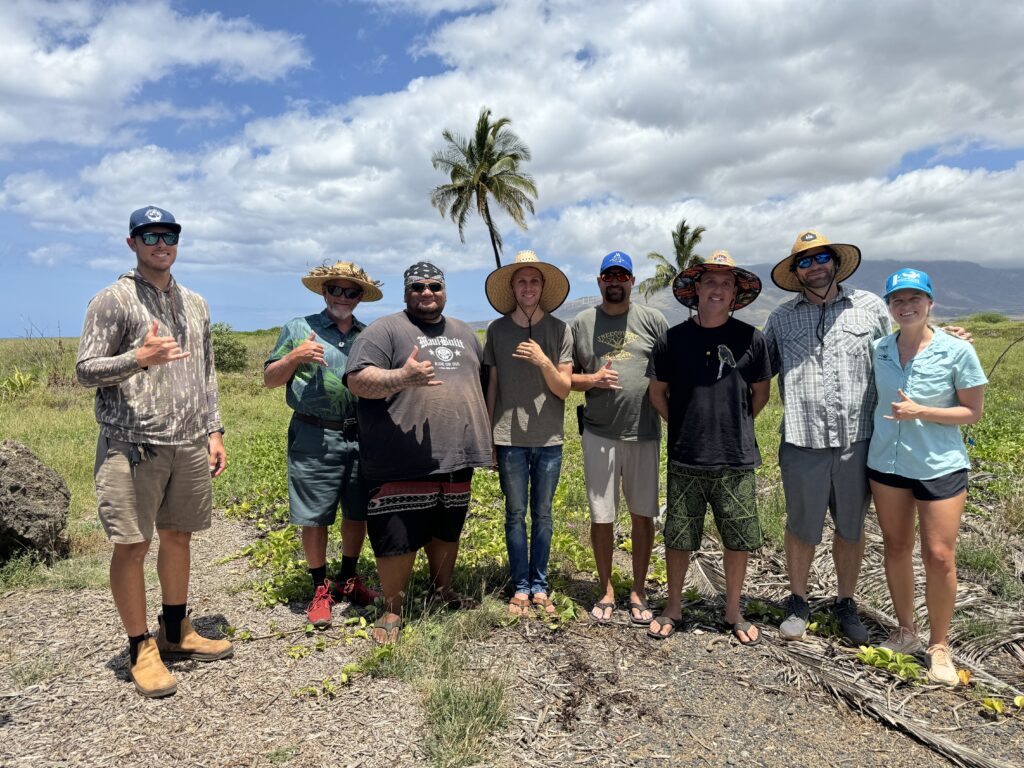Celebrating Success: Reef-Friendly Landscaping Course Launch
The health of our coral reefs is crucial to the environment, providing habitat for countless marine species and protecting coastlines from erosion. To support this vital ecosystem, MNMRC launched its Reef-Friendly Landscaping Certification Course to educate and empower individuals to create sustainable, eco-friendly landscapes that benefit both land and sea.
Our Reef-Friendly Landscaping Certification Course covers 10 topics from site analysis and design basics, mālama ʻāina, to soil health and microbiology, and energy, pollution and climate change. Participants learn how to choose native plants, reduce harmful chemical use, and create landscapes that support local wildlife while protecting marine environments. This course builds upon existing knowledge in traditional land management that has proven successful for generations.
We’re thrilled to announce that our first cohort has successfully completed our inaugural RFL course! Students came from a variety of backgrounds, including home gardeners, professional landscapers, and property managers all united by their desire to expand upon their existing efforts to transition their areas from conventional practices to reef-friendly practices.
Reef-Friendly Landscaping Cohort 1:
Benjamin Rachunas, Paia Youth & Cultural Center
Joseph Pittsenberger, Director of Landscaping, Maui Marriott Ocean Club
Heidi Beltz, Landscaping Committee Member, Kahoma Village Lahaina
Kevin Gavagan, Director of Landscaping at the Four Seasons Maui
Raymond Watson, Property Manager, Honokeana Cove Napili

Cohort 1 Success Stories:
Benjamin Rachunas, Paia Youth & Cultural Center
For over a decade, Benjamin has led the Paia Youth & Cultural Center’s (PYCC) successful coastal restoration program, partnering with the County of Maui Parks Department. They’ve restored native Hawaiian coastal plants like Aki Aki and Akulikuli by planting and reducing foot traffic, despite challenges like occasional droughts. Benjamin’s innovative solution includes installing a water filtration system with a liquid fertilizer injector, using compost from restaurant leftovers and yard clippings. This approach not only enhances plant health but also enriches the educational experiences at PYCC.
Joseph Pittsenberger, Director of Landscaping, Maui Marriott Ocean Club
Joseph has initiated a project to create a chemical-free lawn starting with the large lawn area near the Napili building. His plan involves consulting with soil expert Jonny Klassen to understand the necessary soil treatments and implementing these recommendations. Additionally, Joseph plans to use compost from his on-site nursery to maintain the lawn, avoiding the purchase of external supplies and demonstrating cost savings. Once successful, he aims to extend the chemical-free approach to the entire property.
Heidi Beltz, Landscaping Committee Member, Kahoma Village Lahaina
Heidi is a resident of Kahoma Village in Lahaina, and part of the landscaping committee working on restoring the neighborhood post-fire. Despite the fire, most of the village remains intact, with only 25 of the 276 homes lost, mostly near a water retention basin. Viewing the area as a Kipuka, or sacred spared land, the committee’s goals include soil restoration, native planting, water preservation, and runoff management. Initial steps involved soil testing and using compost tea to rejuvenate the soil, halting synthetic fertilizers and pesticides. They plan to plant native, endemic, and fruiting species, ensuring soil quality with biochar and compost. This community-driven project aims to benefit both residents and the local ecosystem by promoting reef-friendly practices.
Kevin Gavagan, Director of Landscaping at the Four Seasons Maui
Kevin is implementing a soil revitalization process on a 600 sq ft test plot of Seashore Paspallum sod at the resort. The project aims to improve water retention, eliminate synthetic chemicals, enhance pest control, and promote beneficial soil microorganisms. The plot, located along the beach walk, will replace a worn and poorly irrigated lawn. Key steps include soil testing, compost and biochar amendments, and regular applications of soil tea. This initiative not only aims to establish sustainable landscaping practices but also to demonstrate the positive impact of reef-friendly methods on soil and plant health.
Raymond Watson, Property Manager, Honokeana Cove Napili
Raymond transitioned the property’s lawn care from synthetic chemicals to organic practices under MNMRC’s Reef Friendly Landscaping program. He aerated the soil, applied compost tea and Humates Plus, and switched to organic fertilizers and organic pest control. This rehabilitation process resulted in a healthier, greener lawn with improved water retention, fewer yellow spots, and reduced water and labor costs. Residents appreciate the natural, lush appearance and the absence of harmful chemicals.
RFL Cohort 2 – Coming Fall 2024
Given the success of our first cohort, we’re excited to announce that the Reef-Friendly Landscaping Course will be offered again this fall, with additional in-person work sessions on advanced topics such as runoff impacts and watershed connectivity. Those who complete the course will have access to an RFL Network Membership with exclusive access to events and workshops.
We extend our heartfelt thanks to all our participants and program supporters. This course was made possible with support from the County of Maui Environmental Protection and Sustainability Division.
Join us in protecting our reefs! Sign up for our next course, subscribe to our monthly newsletter, Reef in Brief for updates, or participate in our upcoming community events.



No Comments
Sorry, the comment form is closed at this time.